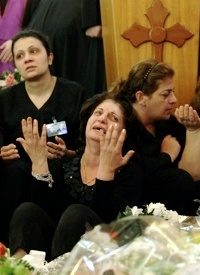
The massacre at the Church of Our Lady of Deliverance in Baghdad is the latest example of the horrific suffering Christians have endured in a nation shattered by war. As reported for The New American on October 29, Iraqi Christians have suffered persecution since the U.S.-led invasion in 2003; any “victory” which U.S. leaders trumpet in that nation has not been enjoyed by the hundreds of thousands of Christians who have now fled their homeland. For many, the persecution carried out by Islamic militants has made emigration a necessity.
While the United States was purportedly victorious in Iraq and continues to battle Islamic militants in Afghanistan, al-Qaeda has now executed an anti-Christian massacre in Baghdad which reveals how hollow such a “victory” remains for the persecuted Christian community within Iraq. According to the Washington Post, the attack involved al-Qaeda militants from outside Iraq:
The siege suggested that al-Qaeda in Iraq, the weakened Sunni insurgent group that asserted responsibility for the attack, remains capable of carrying out mass-casualty operations.
The target, an Assyrian Christian church in the upscale Karrada neighborhood, was highly unusual. The extremist group has in the past year directed its dwindling resources toward crippling symbols of the Shiite-led Iraqi government.
An Iraqi official said Monday that investigators had found at the scene three Yemeni and two Egyptian passports thought to have belonged to the suicide bombers. If confirmed, the finding would be alarming to U.S. and Iraqi officials because they say al-Qaeda in Iraq has struggled to recruit foreign fighters in recent years.
The ability of foreign Islamic Jihadists to enter Iraq and carry out such a heinous crime may prove to be a harbinger of a further escalation of the war against Christians in the ruins of a shattered nation.
The report of the Guardian conveys a sense of the horror unleashed at the Church of Our Lady of Deliverance:
At sunset yesterday, Raghada al-Wafi walked excitedly to mass with news for the priest who married her a month ago. Tonight, exactly 24 hours later, she returned to the Our Lady of Salvation church — this time carried by her family in a coffin that also contained her unborn child.
Today the priest who blessed her marriage and pregnancy minutes before he was killed will also be buried, as will several dozen other members of his congregation — all of them slain by terrorists in an attack that has drawn condemnation from around the world and left the fate of Iraq’s beleaguered Christian community evermore uncertain….
Survivors spoke of religious taunts, random killings and then a gunman slaughtering hostages en masse as the Iraqi army stormed the church to end the four-hour siege.
Ghassan Salah, 17, had just arrived for the Sunday night service with his mother, Nadine, and brother, Ghaswan, when the gunmen burst through the cathedral’s huge wooden doors….
Then the killing began. Ghassan and seven other survivors described to the Guardian a series of events that have broken new ground in a country that has become partly conditioned to violence throughout eight years of war. Thar Abdallah, the priest who married al-Wafi was first to be killed – shot dead where he stood. Gunmen then sprayed the church with bullets as another priest ushered up to 60 people to a small room in the back.
Mona Abdullah Hadad, 62, was in church with her family when the gunmen started shooting. “They said, ‘We will go to paradise if we kill you and you will go to hell,’ ” she said. “We stood beside the wall and they started shooting at the young people. I asked them to kill me and let my grandson live, but they shot him dead and they shot me in the back.”
The Baghdad massacre is but the latest example of Jihadism in action. For the Christians of Iraq, it is a time of mourning and, perhaps for many, a time to consider emigration. The decision to attack a church during the worship service calls to mind the attack last Christmas on a Coptic church in Egypt. For Christians living in the United States and throughout the West, the imminent threat of Jihadist violence may be perceived as a distant concern, or as something expressed in rare acts of terrorism; for Christians living in nations dominated by Islamic ideology, however, persecution is a present reality. In a recent interview with The New American, Rev. Elijah Abraham spoke about what it was like growing up as a Muslim in Iraq:
I grew up with hatred: hatred toward Christianity. I had a lot of Christian neighbors and friends and I loved them, but the Christians I could not separate from Christianity because my community and Islam told me I could not separate America from Christianity … England from Christianity … colonialism from Christianity. So that was the hatred — hatred toward the West — imperialism, capitalism, etc. — and hatred toward the Jews, and Israel, and Zionism.
Nobody told me why I needed to hate. The culture of hate is just a way of life, and not just hatred toward Christians and Jews, but also toward other factions within Islam. There is no peace. There is this constant struggle, on a personal, community, or national level.
For Elijah Abraham, and many other Christians who were raised as Muslims and later converted, the character of Islamic Jihadism manifested in the Baghdad massacre is not a surprise, but a sad confirmation of a consistent pattern.
Photo: Relatives grieve near the coffins of slain Christians at a funeral mass in Baghdad, Iraq, Nov. 2, 2010. The victims were killed Sunday when gunmen stormed a church during Mass and took the entire congregation hostage. The attack was claimed by an al-Qaida-linked organization: AP Images



